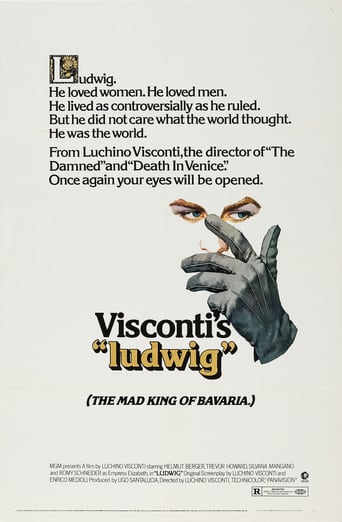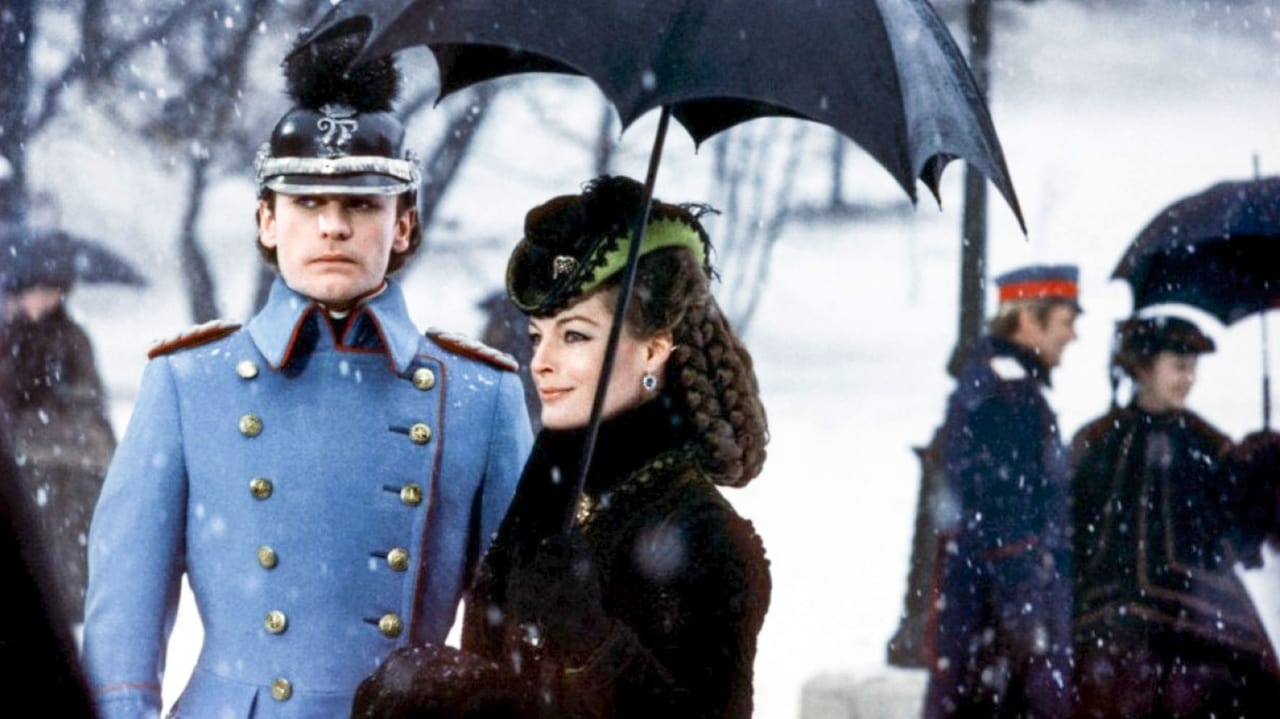christopher-underwood
Being one of a minority who does not like Death in Venice, it was not a complete surprise that I should similarly not particularly enjoy this. What does surprise me is that considering the length (I watched the full 4hr non TV version) so little of consequence happens. So many pretty and colourful uniforms, dresses and rooms put to so little use. Ken Russell would have had a field day and I assume Visconti kept things purposefully restrained but with less than half a dozen memorable moments the length does inevitably become something of a strain. Interesting cast it has to be said but, for me, it is Romy Shneider that truly shine, truly seems to have some idea of what she is doing and actually seems to be enjoying herself, even if she played the part as a favour to the director. Dull and uneventful - how is it possible to say that about a film on the life of such a person?
oOgiandujaOo_and_Eddy_Merckx
From the start of the film when Ludwig, the newly crowned King of Bavaria, is shown in his youth, it's made clear by the narration that he will go mad and eventually be interned for his own safety. From the start this circumstance hangs melancholically over the film.Romy Schneider made a career out of playing unobtainable women, but here, as Elisabeth/Sissi, Empress of Austria, she may as well be ensconced in a quartz grotto at the top of the Himalayas, surrounded by precipice and acres of stone for all the chance Ludwig has of winning her. Perhaps that is how Ludwig imagines her when he sleeps at night. Sissi hates to be taken for granted, she avoids family get-togethers and official engagements, and makes her presence always a cherished unannounced surprise. She speaks loosely of sexual encounters with her grooms whilst encouraging a certain intimacy yet always maintains a distance from serious discourse or lovemaking. She is the worst nightmare of every man. Ludwig is stretched out on tenterhooks. The introductory scene is my favourite, Sissi playing dressage in a circus ring, delighting in the control of her horse, her face lost amongst pastel lights, a part of her life that encapsulates the whole of her life.Ludwig's relations, or lack of relations with women during the film is crushingly sad. It seems finally a bewilderment with them that leads him into the arms of beings he can understand - men. Stricken and alone, finally he even refuses to meet Sissi, for once come not to tease, and it made my heart break.With a government content to do without him, Ludwig withdraws into a fantasia of his own, rejecting materialism, seeking to live beyond bestial factuality, to transcend via the golden barque of the arts. Alongside several architectural commissions, he also became a stream of golden coins, flowing into the coffers of Richard Wagner, who he set up in a house of unbelievable opulence, and provided finance to for the building of the great opera house at Bayreuth, and the staging of several operas. The scenes with Wagner become almost a film within a film, although Ludwig appears the more extraordinary, if only via an accident of birth.I was au fait with both the idea and the execution of Italian dialogue in the mouths of Germans, however I was uneasy going into this movie that it would feel Italian. Luckily Visconti does manage to keep an authentic feel, though one notable lapse for me is Count von Holnstein, who the credits confirmed to me was played by an Italian, Umberto Orsini. Holnstein is the minister who was largely responsible for orchestrating the downfall of Ludwig. In this movie Orsini's manner of speaking, his delivery and facial expressions are quintessentially Italian, even his lines have all the pomposity and false sincerity that Italian officialdom can muster. Only a quibble in a film that I felt like I was living.Quite an astounding experience.
Rindiana
So much could have gone wrong with this follow-up to Visconti's deeply flawed "Morte a Venezia": the treatment of Ludwig II's (dream-)life could have resulted in hokey mystification; Helmut Berger's impersonation could have been badly influenced by the actor's frequently mannered performances; re-casting Romy Schneider as Sissi could have been a mere folly; and stretching the running-time to four hours could have been the nail in the coffin.But miraculously, it all works: Visconti's elegant and empathic direction finds the right biographical tone; Berger has never been better; Romy is simply dazzlingly charming and witty in her second, much more mature approach to the Sissi character; and (except for the bumpy last hour) there's not a single unwanted scene.Plus, Trevor Howard's Richard Wagner is a real treat; the other supporting actors are uniformly excellent; Ludwig's dormant homosexuality is subtly handled; the soundtrack is a marvel and visually, it's Visconti's most impressive work.9 out of 10 moonlit horse rides
Ross
During our visits to Bavaria, we have visited one of his castles (hoping to see the others sometime but only managed to view them from a distance as yet), seen the spectacular stage musical that was put on at the special theatre made for it at Fussen, and I have read a fair bit about him, and I watched this movie enthralled. Ludwig II is a truly fascinating, tortured personality and played so magnificently by Helmut Berger who is so perfectly cast - I couldn't imagine a better performance than this nor a better movie about his life although as I don't understand much German, I haven't had the chance so far to see any other versions.No-one could ever forget, I think, their first sight of his "fairy tale" castle Neuschwanstein (the Bavarian Kinds were the Swan kings). This castle is well known over the world as the castle on which Disney's fairy tale castle logo is based. Inside it's said to be amazing. Ludwig inspires, I think, surprise, awe, admiration, and yet much pity and at times considerable annoyance. This highly artistic and yet emotionally troubled man was not fitted to be a King, much as his close relative and friend Empress Elizabeth of Austria was not entirely fitted to be an Empress and the same at times despairing suicidal tendencies and other problems disturbed them both. Both had difficult lives. Yet it's difficult to know if they would have been any happier as nonenties without the money and position to all too often do and spend exactly as they pleased. Ludwig showered Wagner with money, aiding Wagner for a while to produce some of his great work as the composer was often desperate for money. Is that a good way or a bad way to spend your populace's taxes - on someone who was not even Bavarian yet was a genius? Hard to say.It seems no-one knows for sure whether Ludwig eventually killed himself or was murdered. In the stage musical it is shown as suicide in an incredible scene when nearly all the stage is turned into a real lake into which Ludwig walks slowly to his drowning. At the time we saw this, my husband refused to believe it was really water but must be an illusion. Not so. The Making Of video showed the actor swimming away from the stage lake under water. I haven't been able to find a DVD recording of the show, a great shame, as it would make a fine duo with this superb movie.


 AD
AD






